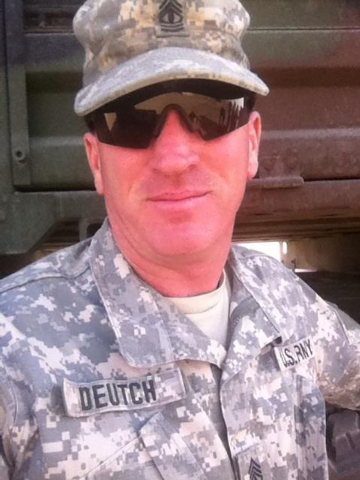
As Americans watch the march of the Sunni militant group Islamic State in Iraq and the Levant (ISIL) converging on Baghdad, local Iraqi War veteran Nevada National Guard 1st Sgt. Richard Deutch could only observe with frustration.
“I told you so,” he says.
The territory captured in a lightning offensive by the ISIL included areas Deutch provided security to convoys marshaling military equipment, food and other supplies to troops in 2006-07. They included now familiar names of towns from the Iraq War, such as Ramadi and Fallujah that have now fallen to the rebels. The Iraq War claimed the lives of 4,400 U.S. soldiers, injured more than 32,000 and cost $2.2 trillion from 2003 to 2011.
“I think the problem is that the security of the country wasn’t established or been set up for maintaining it. You’ve got soldiers leaving their posts and the ISIL taking over. I think there’s a real problem,” Deutch said. “It sucks because we’re seeing it now all happen again. I don’t think there’s anybody out there who didn’t think this wouldn’t happen.”
“As sad as it may be, I think the government should have established the best security it could,” he said.
It’s disheartening, he said, to remember the American soldiers who died in Iraq, while seeing Iraqi soldiers just laying down their arms to the advancing rebels. Deutch’s unit, the 221st Cavalry sustained numerous injuries, one soldier from Maine died from an improvised explosive device (IED) just before his unit left Iraq. American troops withdrew from Iraq after the U.S. was unable to sign a sustainment of forces agreement with the Iraqi government, similar to what is used to station troops in places like Germany.
The militants also picked up a lot of military booty during their march toward the capital. But a National Guard official said the ISIL forces wouldn’t know how to use the complex weapons systems, which are a far cry from World War II tanks.
“A lot of those gun trucks you see in the videos on the news, those were the ones we delivered from Kuwait all the way into Iraq. We’re looking at them all over again,” Deutch said.
Deutch predicted Iraqi Prime Minister Nouri al-Maliki would be leaving office soon. He added when the U.S. talks about sending in advisers, it’s a better way of saying there will be special forces troops on the ground.
“They want you to do everything for them and you watch, we pull out of Afghanistan the same thing is going to happen there. You can’t offer support and civility if nobody wants it,” Deutch said. “My personal opinion is that looking back on Iraq the U.S. government should have walked in, fired everybody and their mother’s brother, keep the infrastructure, remove the leadership.”
By leadership he wasn’t referring to the elected prime minister not people in charge of the infrastructure, like the police and the road workers.
The situation in Iraq was aggravated by centuries-old conflicts between the Shiite branch of Islam, which controls the government, and the Sunni branch, which claims discrimination. Deutch said they didn’t get along very well. But he said many Iraqis have other priorities besides the country.
“Those little countries over there, it’s all a tribal issue. They don’t care they don’t view people like in this society that are all equal. They’re not. They’re not all equals,” Deutch said. “The same way in Afghanistan, they’re loyal to the tribe.”
Deutch couldn’t speculate why many of the Iraqi troops just surrendered, it could have been sympathy with the Sunni rebels or perhaps they were promised something. The ISIL forces published gory photos of mass executions of Iraqi troops.
The conflict puts the U.S. in an awkward position of siding with arch-enemy Iran in the conflict. Iran is predominately a Shiite Muslim country, the same as the Iraqi leadership.
But Deutch said, “it wouldn’t surprise me if some of the people in their ranks were part of this ISIL group. I mean nobody wants a U.S. ally sitting on their border.”
Consultants on national television were confident the rebels would have a very tough time taking Baghdad. Deutch said if the Iraqi troops are running from their positions now they’ll have to fortify Baghdad pretty good.
President Obama has threatened airstrikes against the rebels. When asked what he would suggest Obama do in the current situation, Deutch deferred to his commander in chief.
“It’s not up to me, Obama’s the boss. We do what we’re told.”